

The illustrated guide to a Ph.D. Imagine a circle that contains all of human knowledge: By the time you finish elementary school, you know a little: By the time you finish high school, you know a bit more: With a bachelor's degree, you gain a specialty: A master's degree deepens that specialty: Reading research papers takes you to the edge of human knowledge: Once you're at the boundary, you focus:
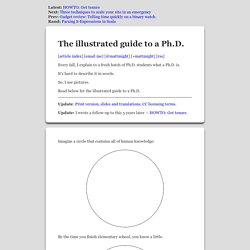
Books and papers every graduate student should read. Jump to For grad students in any field Resources for writing.
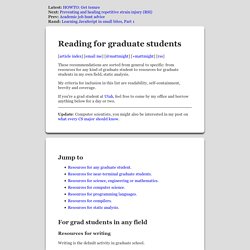
Productivity hints, tips, hacks and tricks for graduate students and professors. Contents Jump to: My philosophy: Optimize transaction costs Distilled into empirically-wrought principles, my high-level advice is: Reduce transaction costs to engaging in productive behavior.
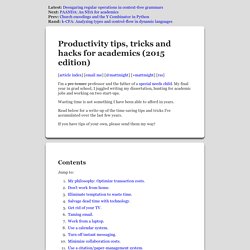
Erect transaction costs to engaging in counter-productive behavior. In short, mold your life so that the path of least resistance is the path of maximum productivity. People are surprised when I tell them I'm lazy. 3 shell scripts: Kill weasel words, avoid the passive, eliminate duplicates. More resources There are four books at arm's length in my office: Strunk and White's The Elements of Style is still a good, if not perfect, reference on style.

Young writers should calibrate their reading of Elements in light of criticism from linguistic experts. Experts claim that the good parts of Strunk and White are common sense. I take issue only with their application of the modifier common. Precision and clarity. 10 tips on how to give an academic talk. The biggest mistake academics make is misjudging their audience.
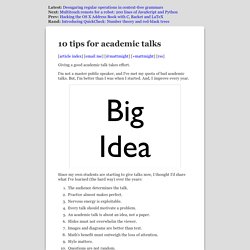
I've been to (many) talks where the talk itself was presented to one or two people in a room of hundreds. (Disclaimer: I've given my fair share of these talks too.) When preparing a talk, glance at the program for the event, or ask your host what you should expect of the audience in terms of background knowledge. Electric meat. Don't touch the electric meat Some time ago, a primatologist ran an experiment with chimpanzees.
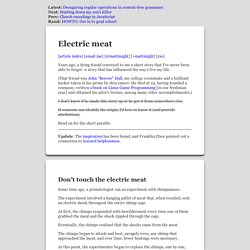
The experiment involved a hanging pallet of meat that, when touched, sent an electric shock througout the entire chimp cage. At first, the chimps responded with bewilderment every time one of them grabbed the meat and the shock rippled through the cage. Eventually, the chimps realized that the shocks came from the meat. The chimps began to attack and beat, savagely even, any chimp that approached the meat, and over time, fewer beatings were necessary. At this point, the experimenter began to replace the chimps, one by one, with chimps that had never been shocked. Naturally, when this new chimp went for the curiously untouched meat right before his eyes, he was attacked. How to peer review scientfic work. Avoid decision fatigue I've written a few hundred peer reviews.
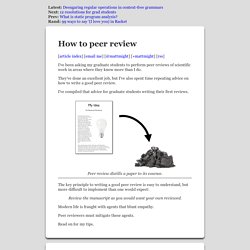
The dominant factor in whether I wrote a high- or low-quality review was decision fatigue. Decision fatigue impacts far more than peer review. As humans, we make decisions all day long. A Ph.D. thesis proposal is a contract. Thesis statement A thesis is a single sentence.
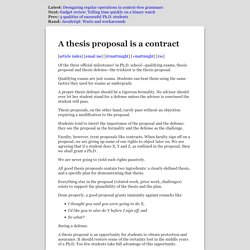
More precisely, it is an active, declarative, defensible sentence. The thesis is what the dissertation will exert its mass to defend. The thesis proposal document and the proposal presentation should place the thesis statement toward the front, so that while reading and listening, the committee can determine whether the thesis is defensible, and whether the proposed research, if successful, would constitute a valid defense of the thesis. When a student doesn't provide an explicit thesis statement, each committee member will infer a thesis statement that aligns with his or her prejudices, and then, some day, the student will have to defend six theses instead of one. My advice is to make the statement as short as possible: how much fat can you trim from it before it's too general too defend with your work? The thesis statement answers the question, "What did humanity learn as a consequence of this dissertation? " 10 reasons Ph.D. students fail.
Focus on grades or coursework No one cares about grades in grad school.
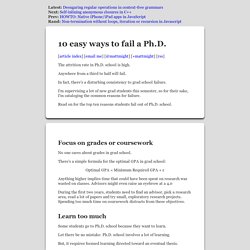
There's a simple formula for the optimal GPA in grad school: Optimal GPA = Minimum Required GPA + ε Anything higher implies time that could have been spent on research was wasted on classes. 3 qualities of successful Ph.D. students: Perseverance, tenacity and cogency. What doesn't matter There's a ruinous misconception that a Ph.D. must be smart.
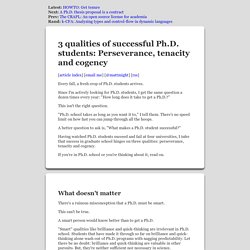
This can't be true. A smart person would know better than to get a Ph.D. "Smart" qualities like brilliance and quick-thinking are irrelevant in Ph.D. school. Students that have made it through so far on brilliance and quick-thinking alone wash out of Ph.D. programs with nagging predictability. Academic martial arts: Defending your Ph.D. A good thesis proposal A proper defense begins at the thesis proposal.
A good thesis proposal makes a subsequent defense significantly easier. A poor thesis proposal delays graduation and reduces the odds of success. A good proposal forms a contract between student and committee: Asking for a letter of recommendation. Aside: Professional correspondence Update: A few readers have asked if I have general recommendations on writing professional emails and correspondence. I do. I have an article on how to write an email. For professional correspondence, I keep a copy of Business Notes by Florence Isaacs on my desk: Classroom Fortress: The Nine Kinds of Students. The Soldier Quiet, obedient and consistent, the Soldier charges into every assignment and stops only once enough damage is done to get the desired grade.
Blog.might.net. Meeting notes: Small thoughts on large cohorts. Pull-based research The pull-based cohort model is researcher-centric. Obtaining LaTeX. LaTeX for the impatient.